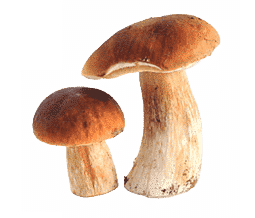
How to Choose the Best Mushroom Tea?
The world of mushroom tea has exploded in popularity, touted for its potential health benefits. But with a vast array of options available, navigating this newfound wellness trend can be overwhelming.
This guide will equip you with the knowledge to choose the best mushroom tea for your unique needs. We’ll delve into medicinal mushrooms, explore factors influencing tea quality, and navigate the brewing process for a flavorful and effective cup.
So, whether you’re seeking to boost focus, promote relaxation, or simply explore the exciting world of functional beverages, this will be your compass to crafting the perfect cup of mushroom tea.
Selecting the Right Mushroom
When it comes to mushroom tea, the key ingredient isn’t just a flavoring agent – it’s a potential pathway to targeted wellness. Different medicinal mushrooms, like the shiitake mushrooms, boast unique properties, making choosing the right one crucial for maximizing your tea’s benefits.
Types of Mushrooms
The kingdom of mushrooms offers a diverse selection, each with its claim to fame:
Lion’s Mane: Nicknamed the “Smart Mushroom,” Lion’s Mane has been linked to improved cognitive function, memory, and focus.
Reishi Mushrooms: Often referred to as the “Mushroom of Immortality” in traditional Chinese medicine, Reishi is known for its adaptogenic properties, which can potentially promote relaxation and stress relief.
Chaga Mushrooms: This powerhouse mushroom is packed with antioxidants and may support the immune function of your immune system.
Cordyceps: Athletes, this one’s for you! Cordyceps is believed to enhance energy levels and endurance.
This is just a glimpse into the vast world of medicinal mushrooms. Each variety offers a distinct set of potential benefits.
Matching Needs with Mushrooms
Think of your mushroom tea as a targeted wellness tool. The benefits of mushroom vary so find what suits your needs most . Here’s how to match your needs with the right mushroom:
Trouble Sleeping? Chaga and Reishi mushroom tea might be your allies, promoting relaxation and potentially improving sleep quality.
Feeling Foggy? Lion’s Mane could be your brainpower booster, supporting cognitive function and focus.
Need a Stamina Boost? Cordyceps might be the answer, with its potential to enhance energy levels.
Single Serving vs. Synergistic Blends
Mushroom tea comes in two main varieties: single-mushroom and multi-mushroom blends.
Single-Mushroom: This is a great option if you have a specific concern and want to target it directly.
Multi-Mushroom Blends: These blends combine various mushrooms, offering a wider range of potential benefits. They can be a good choice for overall well-being or addressing multiple concerns.
Understanding the different types of medicinal mushrooms and how they align with your needs is the first step to brewing the perfect cup of functional tea.
Find the Right Tea Quality
Like any food or beverage, the quality of your mushroom tea significantly impacts its effectiveness. Here’s how to evaluate your tea for optimal results:
Origin of the Mushroom
Organic or Wildcrafted: Look for organic mushrooms whenever possible. This minimizes exposure to pesticides and ensures they’re grown in healthy soil. Wildcrafted options can be good, but ensure they’re sourced from clean, unpolluted environments.
Location Matters: The geographic origin of the mushrooms can influence their potency. Some regions are known for cultivating specific mushrooms with optimal qualities. Research the source and consider the reputation of the grower.
How the Mushroom was Processed
Whole Mushrooms vs. Extracts: Whole mushroom teas offer a more natural approach, but potency can vary depending on the brewing method. Extracts concentrate the active compounds, potentially delivering a stronger effect, but ensure they’re extracted using natural methods.
Beware of Fillers: Some commercially available teas might contain fillers like starches or flavorings. These dilute the potency of the mushrooms and detract from the overall quality. Choose brands that prioritize pure mushroom content.
If the Mushroom was Tested
Organic Certifications: Organic certification verifies the mushrooms were grown according to strict organic standards.
Third-Party Testing: Look for brands that have their products tested by independent labs for potency, purity, and potential contaminants. This ensures you’re getting what’s advertised and that the tea is safe for consumption.
Prioritizing these factors will help you be confident that you’re selecting a high-quality mushroom tea that delivers the desired wellness benefits.
Consider the Taste and Preparation
Mushroom tea might be a path to wellness, but that doesn’t mean it has to be a flavorless journey. Understanding the taste profiles of different mushrooms and exploring brewing methods can elevate your tea experience.
Different Flavors of Mushroom Tea
Just like their health benefits, mushrooms offer a range of flavor profiles:
Earthy and Woodsy: This is a common characteristic of many medicinal mushrooms, such as Chaga mushroom tea and Reishi mushrooms. Some find it pleasant, while others might prefer to mask it.
Slightly Bitter: Certain mushrooms, like Cordyceps, can be slightly bitter. Adding ginger or lemon can help balance this out.
Unexpected Sweetness: Lion’s Mane can surprise you with a subtle sweetness, making it a good choice for those sensitive to bitterness.
Convenience vs. Customization: Pre-made vs. DIY
When it comes to brewing, you have two main options:
Pre-made Blends: These offer convenience, often in tea bags or loose-leaf blends with complementary flavors. They’re a great starting point if you’re new to mushroom tea.
DIY Options: For the adventurous tea enthusiast, buying loose mushrooms allows for customization. You can experiment with different types and create your flavor combinations.
Tips when Brewing a Mushroom Tea
Here are some tips to brew a delicious and effective cup of mushroom tea:
Temperature Matters: Use hot water (around 195°F) for optimal extraction of beneficial compounds.
Steeping Time: Different mushrooms require different steeping times. Generally, aim for 10-15 minutes for a potent brew.
Flavor Boosters: Experiment with flavorings like ginger, lemon, honey, or spices to enhance your tea’s taste profile.
Multiple Infusions: Some recommend re-steeping your mushrooms for a second cup, although the potency might be slightly weaker.
Understanding the unique flavors of different mushrooms and exploring brewing methods can create a mushroom tea experience that’s both functional and enjoyable.
Prioritize Safety and Dosage
While mushroom tea offers many potential benefits, prioritizing safety and responsible consumption is paramount. Here’s what to keep in mind:
Potential Side Effects and Interactions
Potential Side Effects: Like any natural product, mushroom tea can have side effects, such as mild upset stomach, nausea, or headaches, especially when starting.
Beware of Medication Interactions: Some mushroom supplements can interact with medications. Consult your doctor before consuming mushroom tea, especially if you take any prescription drugs.
Start with a Low Dose
Less is Often More: It’s always best to start with a low dose of mushroom tea, particularly if you’re new to it. Gradually increase the amount as your body adjusts.
Listen to Your Body: Pay close attention to how you feel after consuming mushroom tea. If you experience any unpleasant side effects, discontinue use and consult a healthcare professional.
Consult a Healthcare Professional
Seek Expert Advice: Before embarking on your mushroom tea journey, consider consulting a healthcare professional or a qualified herbalist. They can provide personalized guidance based on your health history and pre-existing conditions.
Pregnancy and Breastfeeding: Pregnant or breastfeeding women should avoid consuming mushroom tea due to potential unknown risks.
Remember, prioritizing safety and responsible consumption ensures you experience the positive aspects of drinking mushroom tea without compromising your well-being. By consulting a healthcare professional and starting low, you can confidently embark on your mushroom tea journey.
Final Thoughts
How to choose the best mushroom tea is not difficult at all. Just remember that that the best mushroom tea blends aren’t a one-size-fits-all solution; it’s a personalized journey waiting to be brewed.
You hold the power to create a cup that perfectly complements your individual needs and preferences. Don’t be afraid to experiment with different types of mushrooms and mushroom coffee brands from the local health food store, each offering unique taste profiles and potential benefits.
Just prioritize safety and responsible consumption. Start with low doses, listen to your body, and consult a healthcare professional with any concerns. Remember, every cup is an opportunity to discover new flavors, support your well-being, and create a personalized wellness ritual that’s both delicious and functional.
Visit Mindmend for more mushroom-related contents.




